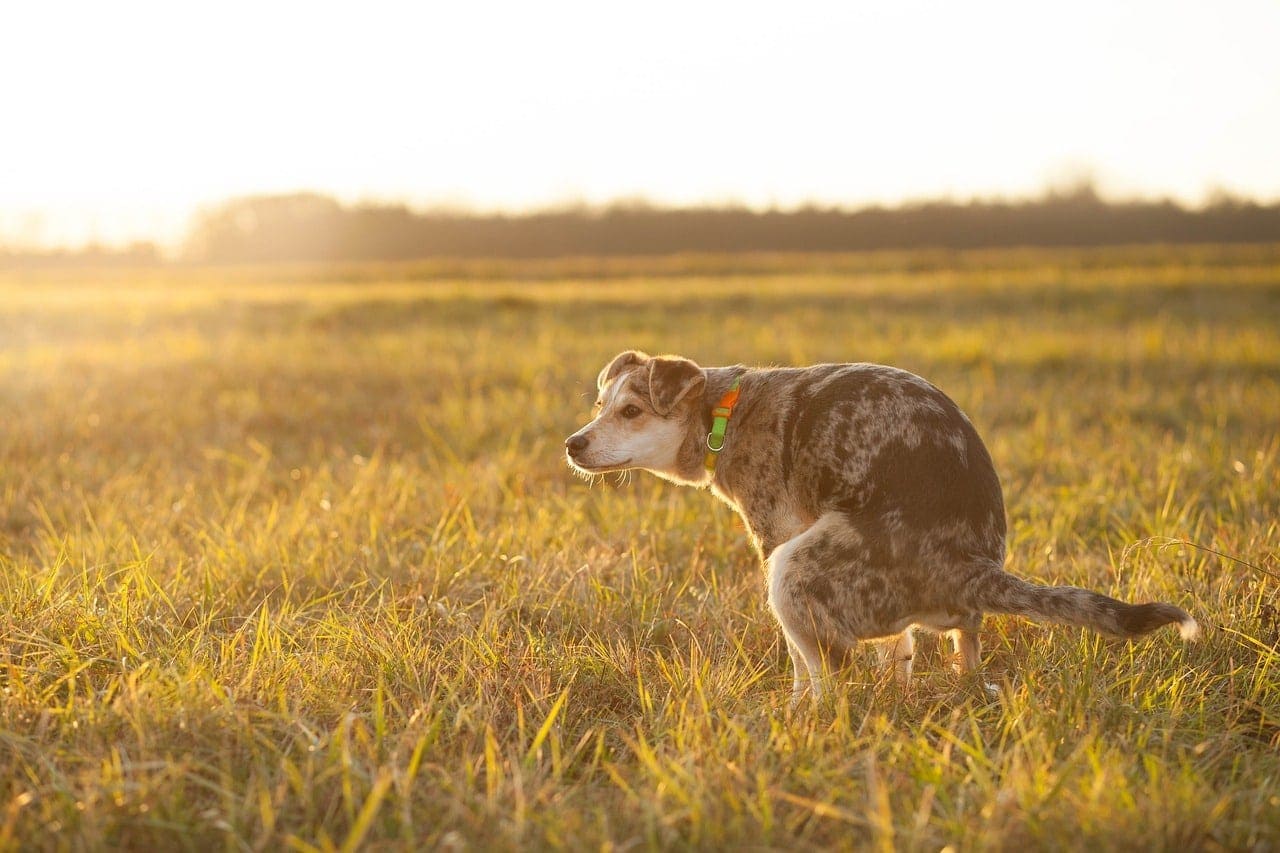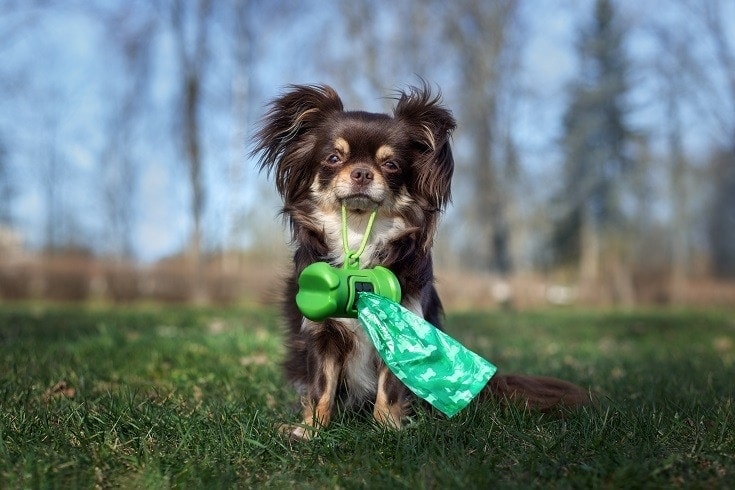How To Change Your Dog’s Pooping Spot
If you’re eager to train your puppy or dog to poop on the grass or want to fix their new bad pooping habit back to their good old one, there are several ways to do it.
To start the training process, you could use pee pads. Puppies and dogs tend to use pee pads because of the way they smell. You can put one down on the concrete area your dog has been pooping on, and when they use it, praise them and give them treats.
Once your dog solely poops on the pads, move them to the grass. You can put some grass clippings on the pee pads until your dog is familiar with the smell and then remove the pads altogether. When your dog poops on the grass where the pads used to be, praise them and let them know they’re doing the right thing.
Go Out with Your Dog
Once you’ve fed your dog and given it a bit of time, take your dog outside to relieve themselves. You can let your dog out to sniff around and continuously call them to the grassy area until they poop, or you can keep your dog on a leash and resist their tugs to run over to the concrete area. Eventually, your dog will poop on the grass. Make sure to praise them and give them treats when they do.
If your dog doesn’t poop when you’ve taken them outside, take them back inside and repeat the process after a bit of time or when your dog starts to become restless. Continue this process until your dog starts to poop on the grass without your intervention or influence.
Grass is Wet or Frozen
Ever used an outhouse in the middle of the winter? If you haven’t, we wouldn’t recommend it. Many dogs are uncomfortable in cold temperatures, especially if the grass is wet or frozen. Some dogs are stubborn, and they will hold their poop until conditions improve, while others just find somewhere else—like your cement walkway or the driveway.
The biggest thing here is comfort because many dogs don’t enjoy getting their paws wet, muddy, or cold. So, if it’s wet or cold, the grass could be uncomfortable for them.
Possible Solution: There isn’t anything we can do to control the weather. However, if there is a spot in your yard that doesn’t get as much rain or isn’t frozen, encourage your dog to go to the bathroom in those spots.

If there isn’t any apparent reason your dog has begun pooping on concrete, and they have usually done their business on the grass, age is a potential issue. If your dog is young, you can rule this one out. However, bathroom training may only be one problem if your furry friend is getting up there in years.
Just like humans, dogs can also get dementia. When their cognitive function declines, they start to do strange things and act out of character—where they go to the bathroom, for example.
Age-related illnesses like this demonstrate the importance of taking your dog for regular checkups at the vet. A vet will be able to determine if cognitive decline is the root of the issues your dog is having.
Possible Solution: We can’t cure old age for ourselves or our pets, but we can give them love and support to make them comfortable in their old age.
Typically, arthritis is another problem we would expect to see in an older dog, but it’s not limited to age. Pooping on grass may be the easiest thing to do for your dog. It might be hard to imagine, but if they are in a lot of pain, walking out into the yard could be difficult because it is soft and uneven. So, they choose to use the sidewalk as a bathroom instead because it’s flat and hard.
Possible Solution: There is no cure for arthritis, but if you think your dog may be suffering from it, you can talk to your vet about medication to ease the pain. Other things that help with arthritis pain are a good diet and gentle exercise.

Puppy does what puppy wants. This extends to their bathroom habits. If you’ve ever owned a puppy, you’re probably familiar with training pads and accidents around the house. Training outside is no different. If you take a puppy outside, they will poop and pee wherever it strikes their fancy until you show them where to go.
Unfortunately, unless you bought your dog from a reputable breeder, there is a good chance it was originally from a puppy mill. These places don’t give new puppies the option of grass. The puppy usually lives in a concrete area and is given a newspaper to do its business. So, when you bring the puppy home, the most familiar thing to them may be your sidewalk.
Possible Solution: House training a puppy takes commitment and diligence. Once you train your puppy to use the grass as his bathroom, you should be good to go unless one of the other problems in this list pops up.
When something bad happens to us, we learn to associate certain things with bad experiences. This idea is no different for dogs. Your backyard is filled with creepy crawlies that bite and sting. You probably wouldn’t like it if your ankle got bit while you were taking a poop! If this happens to a dog, they could relate the negative experience to pooping in the grass. Then pooping on concrete becomes the safer option for them.
Possible Solution: You can gently encourage your dog to use a different area of the yard as its bathroom to break this habit of concrete pooping.
How to remove urine and feces odors from concrete.
Tales of dogs pooping on the neighbor’s lawn, on the back deck, or even on the bed are fairly common, but pooping on the driveway seems absurd.
Believe it or not, it’s really not that unusual. They poop once on the driveway, and this becomes their go-to spot.
Why does my dog poop on the driveway? Dogs may poop on the driveway for several reasons: they may be attempting to mark their territory or cover up scents from other animals, they may have had a previous unpleasant experience with grass or your yard, they may not be feeling well, or the behavior may have simply become a habit.
If you are having trouble with your dog pooping in the driveway, you’ll want to gain control of this behavior quickly as the longer it continues, the harder it will be to break.
The first step in controlling this behavior is learning why it happens. There’s no cause for alarm as many preventative measures exist to end this habit.